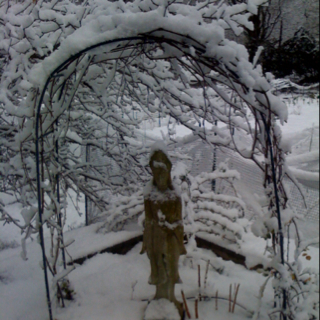I spent all last week in silent retreat, a practice the Sisters here observe for one week each year, and one day each month. I had never embarked on such an extended retreat, and--let me tell you--it was a wonderful experience. If you ever have the opportunity to carve out some time for yourself, consider it.
I tried to more closely follow the daily rhythm of sunrise and sunset, rising early and going to bed early. I also followed a modified fast, where I ate only two bowls of a vegetable broth and drank tea for the first three days, then ate simple grains (polenta, oatmeal) and fruit on the last two days. I did yoga and meditated each day. And I read, and read, and read. I read about meditating, about an Indian holy man named Sri Ramana Maharshi, about spiritual-physical exercises, about forest gardening, and about Reiki. This was especially gratifying, because even though I had been an avid reader most of my life, I had largely stopped reading non-academic books during graduate school, and for the three years since. To be able to pick up a book and be totally engrossed once more was so refreshing, like falling back into a pool of myself. Deep reading as a kind of sense memory...
During the retreat, I calmed down, moved more slowly, and inhabited my body more deeply. I've been learning about how to calm the mind, to stop the incessant activity of thinking that defines our modern lives. In that more integrated mind/body way of being, I made connections, experienced realizations, and released emotions--early one morning, I woke myself up with deep laughter, that lasted for minutes. I have no idea what I was laughing about, but it felt wonderful, exhilarating.
On Sunday, Sister Catherine Grace gave a sermon about darkness and light, our human fixation with all things light, and our avoidance of the dark. In the sermon, she cited some recent research* about how our sleep has been affected by the pushing back of the dark through electricity. In that research, a group of people were in darkness for 14 hours a day; after correcting an accumulated sleep deficit, they all began exhibiting an interesting sleep pattern. They would lay in bed for two hours resting, then sleep for 4 hours, then they would wake up--not to full awareness, but not in sleep either, but a different state altogether that was like a wakeful dream state. They would remain in that state for two hours, then sleep for about another 4 hours.
The researcher took them seriously when all the subjects remarked that, when awake, they felt more awake than they ever had been--he studied their brain activity after sleeping in this other pattern, and found that they were indeed experiencing something that few of us ever do. When awake, their brains were actually significantly more active--more awake--than the rest of us. Our "regular" sleep pattern of 6-8 hours, unbroken, apparently does not allow us to experience the benefits of that in-between state, which the researcher hypothesized was more readily available to our ancestors, given the fact that they more closely tracked their activities to sunrise and sunset.
I think that kind of enhanced wakefulness that was found in the sleep study was similar to the state I was sometimes in during my retreat--where my mind seemed to find associations and make connections between diverse literatures very easily, where my writing seemed to simply flow. I felt much more integrated and whole, and my very being felt lighter, more sensitive and energized.
Imagine what our world might look like if we all put down our iPhones and computers, shut off our TVs, and settled into bed when darkness fell. What if we rested, rather than driving ourselves to fight and push away the darkness, to squeeze productivity and high-stimulus entertainment into every possible minute? Would we have a little more patience with one another, a little more compassion for one another, a little more perspective on life and what matters?
For Lent, the Sisters and I have decided to observe not only a fast every Friday, but to be in silent retreat as well. And further, to fast from the use of electricity after dark. It's a bit surprising to find myself, with the days getting longer and calendar turning toward spring, to be welcoming more darkness into my life. But here I am, turning down the lights, opening myself up to those wakeful dream states, and hoping for intense awakening.
*Unfortunately, the article she cited is available to subscribers only--here is the link: http://www.tricycle.com/feature/turn-out-lights

 I'm heading into a five-day silent retreat, and will be offline for the duration. I'm looking forward to this time of meditation, yoga, prayer, writing, and rest.
I'm heading into a five-day silent retreat, and will be offline for the duration. I'm looking forward to this time of meditation, yoga, prayer, writing, and rest. 

